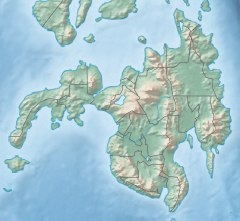Manupali River: Difference between revisions
Appearance
Content deleted Content added
edited text |
Sanglahi86 (talk | contribs) m +{{NMindanao-geo-stub}} using StubSorter |
||
| (4 intermediate revisions by 3 users not shown) | |||
| Line 1: | Line 1: | ||
{{Use mdy dates|date=November 2022}} |
|||
{{Use Philippine English|date=November 2022}} |
|||
{{Infobox river |
{{Infobox river |
||
| name = Manupali River |
| name = Manupali River |
||
| Line 12: | Line 14: | ||
| map_caption = |
| map_caption = |
||
| map_alt = |
| map_alt = |
||
| pushpin_map = Mindanao#Philippines |
| pushpin_map = Mindanao mainland#Philippines |
||
| pushpin_map_size = |
| pushpin_map_size = |
||
| pushpin_map_caption= |
| pushpin_map_caption= |
||
| Line 44: | Line 46: | ||
| source1_elevation = |
| source1_elevation = |
||
| mouth = |
| mouth = |
||
| mouth_location = [[Pulangi River]] |
| mouth_location = [[Pulangi River]] <!-- probably should be Sawaga River --> |
||
| mouth_coordinates = {{coord|7.979413|N|125.146261|E|format=dms|dim:15000_region:PH_type:river|display=inline,title}} <!-- confluence with Sawaga River --> |
|||
| mouth_coordinates = |
|||
| mouth_elevation = |
| mouth_elevation = |
||
| progression = Manupali–Pulangi–[[Mindanao River|Mindanao]] |
| progression = Manupali–Pulangi–[[Mindanao River|Mindanao]] |
||
| Line 63: | Line 65: | ||
}} |
}} |
||
The '''Manupali River''' is a [[river]] in central [[Bukidnon]], on the [[Philippines|Philippine]] island of [[Mindanao]].<ref name="realities">{{cite web|title=Realities of the Watershed Management Approach: The Manupali Watershed Approach|url=http://pdf.dec.org/pdf_docs/PNADE425.pdf|publisher=Institute of Strategic Planning and Policy Studies |accessdate= |
The '''Manupali River''' is a [[river]] in central [[Bukidnon]], on the [[Philippines|Philippine]] island of [[Mindanao]].<ref name="realities">{{cite web|title=Realities of the Watershed Management Approach: The Manupali Watershed Approach|url=http://pdf.dec.org/pdf_docs/PNADE425.pdf|publisher=Institute of Strategic Planning and Policy Studies |accessdate=September 9, 2010|author=Agnes C. Rola |author2=Antonio T. Sumbalan |author3=Vel J. Sumingit|format=PDF|year=2004}}</ref><ref name="capri">{{cite web|title=Conflict, Cooperation, & Collective Action: Land use, water rights, and water scarcity in Manupali watershed, southern Philippines|url=http://www.capri.cgiar.org/pdf/CAPRi_Conflict_Duque-Pinon.pdf|publisher=Collective Action and Property Rights (CAPRi)|accessdate=September 9, 2010|author=Caroline Duque-Piñon|author2=Delia Catacutan|author3=Beria Leimona|author4=Emma Abasolo|author5=Meine van-Noordwijk|author6=Lydia Tiongco|year=2010|archive-url=https://web.archive.org/web/20100716220019/http://www.capri.cgiar.org/pdf/CAPRi_Conflict_Duque-Pinon.pdf|archive-date=July 16, 2010|url-status=dead}}</ref><ref name="watershed">{{cite web|title=Economic Growth and Watershed Management: Drivers of Research and Development Innovations|url=http://www.nafri.org.la/document/URDP/documents/SSLWMpapers/ch4_06_delia.pdf|publisher=National Agriculture & Forestry Research Institute (Laos)|accessdate=September 9, 2010|author=Delia C. Catacutan|author2=C.E. Duque|author3=R.E. Margate|author4=L.J. Arbes|format=PDF|archive-url=https://web.archive.org/web/20110721020406/http://www.nafri.org.la/document/URDP/documents/SSLWMpapers/ch4_06_delia.pdf|archive-date=July 21, 2011|url-status=dead}}</ref><ref name="pids">{{cite web|title=Winning the Water War: watersheds, water policies and water institutions|url=http://dirp4.pids.gov.ph/ris/books/pidsbk04-waterwar.pdf|publisher=Philippine Institute For Development Studies (PIDS) & Philippine Council For Agriculture, Forestry & Natural Resources Research & Developmnent (PCARRD)|accessdate=September 9, 2010|author=Agnes C. Rola |author2=Herminia A. Francisco |author3=Jennifer P.T. Liguton|format=PDF}}</ref> It is one of the major [[tributaries]] of the [[Pulangi River]] that drains into the [[Rio Grande de Mindanao]]. Among its tributaries are Balangbangan Creek and the Maagnao and Tandacol Rivers. |
||
==References== |
==References== |
||
{{reflist}} |
{{reflist}} |
||
{{coord|7|59|N|125|09|E|display=title|region:PH_type:river_source:GNS-enwiki}} |
|||
[[Category:Rivers of the Philippines]] |
[[Category:Rivers of the Philippines]] |
||
| Line 75: | Line 76: | ||
{{Philippines-river-stub}} |
{{Philippines-river-stub}} |
||
{{NMindanao-geo-stub}} |
|||
Latest revision as of 11:41, 9 September 2024
| Manupali River | |
|---|---|
| Location | |
| Country | Philippines |
| Region | Northern Mindanao |
| Province | Bukidnon |
| Physical characteristics | |
| Mouth | |
• location | Pulangi River |
• coordinates | 7°58′46″N 125°08′47″E / 7.979413°N 125.146261°E |
| Basin features | |
| Progression | Manupali–Pulangi–Mindanao |
The Manupali River is a river in central Bukidnon, on the Philippine island of Mindanao.[1][2][3][4] It is one of the major tributaries of the Pulangi River that drains into the Rio Grande de Mindanao. Among its tributaries are Balangbangan Creek and the Maagnao and Tandacol Rivers.
References
[edit]- ^ Agnes C. Rola; Antonio T. Sumbalan; Vel J. Sumingit (2004). "Realities of the Watershed Management Approach: The Manupali Watershed Approach" (PDF). Institute of Strategic Planning and Policy Studies. Retrieved September 9, 2010.
- ^ Caroline Duque-Piñon; Delia Catacutan; Beria Leimona; Emma Abasolo; Meine van-Noordwijk; Lydia Tiongco (2010). "Conflict, Cooperation, & Collective Action: Land use, water rights, and water scarcity in Manupali watershed, southern Philippines" (PDF). Collective Action and Property Rights (CAPRi). Archived from the original (PDF) on July 16, 2010. Retrieved September 9, 2010.
- ^ Delia C. Catacutan; C.E. Duque; R.E. Margate; L.J. Arbes. "Economic Growth and Watershed Management: Drivers of Research and Development Innovations" (PDF). National Agriculture & Forestry Research Institute (Laos). Archived from the original (PDF) on July 21, 2011. Retrieved September 9, 2010.
- ^ Agnes C. Rola; Herminia A. Francisco; Jennifer P.T. Liguton. "Winning the Water War: watersheds, water policies and water institutions" (PDF). Philippine Institute For Development Studies (PIDS) & Philippine Council For Agriculture, Forestry & Natural Resources Research & Developmnent (PCARRD). Retrieved September 9, 2010.


